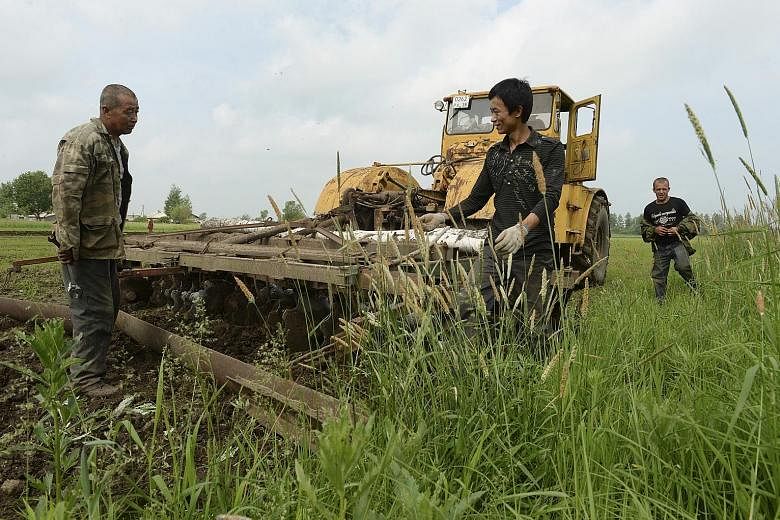OPYTNOE POLE (Russia) • Perched in the cabin of a clunky Russian tractor, Mr Li Chengbin, a peasant farmer from China, drove round and round in ever-widening circles, ploughing a field to get it ready for planting - and rejoicing at the opportunities offered by untamed lands in the Russian far east almost empty of people.
Back in China, the 62-year-old said, he never had a plot anywhere near as big as the 33ha spread he and his son now farm in Russia. The vast majority of China's 300 million peasants have barely 0.8ha, and Mr Li's family farm is even smaller.
"In China, this much land would make me the biggest farmer in the country," Mr Li said, yanking a rusty lever to try and get his puffing tractor to go faster.
He and his son had bought the tractor, along with other decrepit bits of farming equipment, from what was left of a defunct, Soviet-era collective farm.
They got their land through an arrangement with a local woman who leases the formerly state farm property and lets Mr Li and his son Li Xin farm it in return for cash.
The weather, scorching in summer and well below freezing in winter, is not much worse than what they are used to in northern China.
The younger Mr Li, 35, said he had first come to Russia about a decade ago to work as a farm labourer. He set up a pig farm with local woman, Ms Nelya Zarutskaya.
His father, struggling to survive on their tiny family farm in Heilongjiang province, joined his son in Russia three years ago, along with an uncle.
The three now live in a ramshackle farm building along with Ms Zarutskaya and her young son.
Russia, the younger Mr Li said, is a "tough place" to live, especially in the winter, but it has given him prospects he would never have had in China. "There are too many people in China, and there is nothing for people like me over there."
But Russia still spasms with bouts of anti-Chinese sentiment. The Chinese began moving to farms in Russia in significant numbers after the 1991 collapse of the Soviet Union.
Among Russian nationalists in the west of the country, the presence of Chinese farmers in Russia's far east has stirred frenzied fear of a stealthy Chinese takeover.
Here in the far east, however, local officials and residents, while grumbling that they cannot keep up with Chinese work habits, tend to see China and its vast pool of industrious labour as the best hope of developing impoverished regions that often feel neglected by Moscow.
"Our own people have been spoilt," said Ms Lyudmilla Voron, head of the local council for the district covering Opytnoe Pole, an area in Russia next to China's Heilongjiang province. "The men drink too much and don't want to work."
Locals, she added, "have much to learn from Chinese peasants". She said there were no real figures for the number of Chinese working in the area. With a Russian population of just 1,716 people, her district has hundreds of Chinese.
Her daughter Maria, who is the district administration chief, complained that many Chinese worked without registering.
But she, too, cheered their work ethic. "They all work like mad," she said, praising them for turning previously unused land into productive farms.
NEW YORK TIMES

